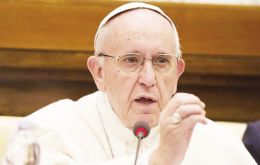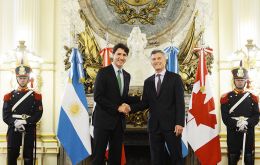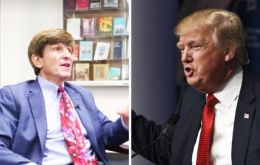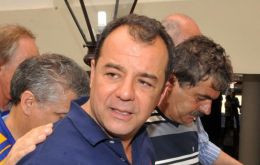MercoPress. South Atlantic News Agency
Politics
-
Friday, November 18th 2016 - 11:36 UTC
“Money must serve rather than govern” Francis tells conference of Catholic businesses

Pope Francis warned Catholic business leaders against the danger of worshipping money, saying corruption is to follow the lies of the devil, whereas practices aimed for the common good are always built around principals of honesty and fraternity. “Corruption is the worst social plague. It’s the lie of seeking personal gain of that of the group itself under the guise of a service to society,” the Pope said on Thursday.
-
Friday, November 18th 2016 - 11:13 UTC
Argentina pledges to reduce carbon dioxide emissions by 20 million by 2030

Argentina will reduce carbon dioxide emissions from 570 to 483 million tonnes by 2030, Environment Minister Sergio Bergman announces in Marrakesh.Argentina's Minister of Environment and Sustainable Development Sergio Bergman said Thursday at the United Nation's 22nd Conference of the Parties to the U.N. Framework Convention on Climate Change in Marrakesh (COP 22) that his country was working on a plan to achieve “zero deforestation,” the recovery of degraded lands and the change of energy matrix.
-
Friday, November 18th 2016 - 11:02 UTC
Southern Cone countries reach border control accords

Argentina, Bolivia, Brazil, Chile, Paraguay and Uruguay, sign in Brasilia documents providing for the joint work by security agencies to fight drug trafficking, smuggling of goods and people and money laundering.
-
Friday, November 18th 2016 - 09:36 UTC
Argentina and Canada allies in supporting free trade and combating protectionism

Argentine president Mauricio Macri and Canadian Prime Minister Justin Trudeau took direct aim on Thursday at the walls of protectionism set to be erected around the United States, saying that freer trade is the best way to pull their countries out of economic uncertainty. The two leaders said there is real anxiety that progress and global trade have resulted in people being left behind or children being robbed of the same opportunities afforded their parents and grandparents.
-
Friday, November 18th 2016 - 09:22 UTC
Trump's presidency short lived? Two experts who anticipated his victory make the prediction

Donald Trump caught the world by surprise when he emerged victorious at the United States elections, but his stay at the White House could be short-lived, according to university professor who has correctly predicted presidential poll outcomes for the last 30 years. A similar prediction has been made by journalist and filmmaker Michael Moore who also forecasted Trump's victory with weeks' anticipation.
-
Friday, November 18th 2016 - 09:15 UTC
Yellen intends to remain her four-year term; anticipates rate increase “relatively soon”

The United States Federal Reserve chair Janet Yellen told Congress on Thursday that she is not stepping down. Her statement follows on strong attacks during the campaign from president elect Donald Trump who claimed the Fed was favoring president Barack Obama and candidate Hillary Clinton with its low interest rate policy.
-
Friday, November 18th 2016 - 08:58 UTC
Because of “pre-existing commitments”, Dylan will not pick up the Nobel Prize in Stockholm

Bob Dylan says he will not travel to Stockholm to pick up the 2016 Nobel Prize for literature. The Swedish Academy, which gives out the Nobel prizes, says it received a personal letter from Dylan saying he had “pre-existing commitments”. From the very beginning there was a lot of speculation whether Bob Dylan even wanted his Nobel Prize in Literature since it took him more than two weeks to acknowledge that he'd won.
-
Friday, November 18th 2016 - 08:53 UTC
Former governor of Rio do Janeiro arrested for allegedly embezzling public works funds

The former governor of the Brazilian state of Rio de Janeiro was arrested Thursday for allegedly embezzling funds intended for public works projects, authorities said. Sergio Cabral was apprehended at his home in Rio de Janeiro city's Leblon neighborhood just one day after another former governor of that same state, Anthony Garotinho, was detained on suspicion of attempted vote-rigging.
-
Friday, November 18th 2016 - 08:03 UTC
Post-truth, has been named Oxford Dictionaries 2016 international word

”Post-truth” has been named Oxford Dictionaries’ 2016 international word of the year, vanquishing a politically charged field that included “adulting,” “alt-right,” “Brexiteer,” “glass cliff” and “woke.” The use of “post-truth”, defined as “relating to or denoting circumstances in which objective facts are less influential in shaping public opinion than appeals to emotion and personal belief”, increased by 2,000 percent over last year, according to analysis of the Oxford English Corpus, which collects roughly 150 million words of spoken and written English from various sources each month.
-
Friday, November 18th 2016 - 07:58 UTC
Rosmit Mantilla released from prison late Thursday evening

Venezuelan opposition leader Rosmit Mantilla was released from jail late Thursday evening by the government of Nicolás Maduro. Mantilla was finally allowed to undergo surgery on November 13 and is believed to be one of the first political prisoners to be set free in the coming days.
